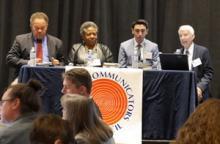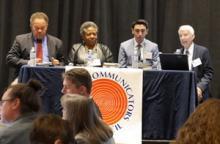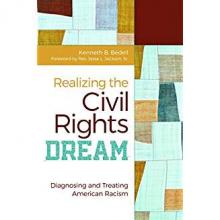Religion Communicators Discuss Civil Rights

Faith groups should recommit to leadership on civil rights, panel members say
By Douglas F. Cannon, Ph.D., APR+M, Fellow PRSA

Dr. Robert M. Franklin Jr., Yvette Moore, Kemal Budak, Rev. Dr. Kenneth Bedell (photo by Andy and Malinda Rawls)
Faith communities have retreated from moral leadership in the post-civil-rights era, the Rev. Dr. Robert Franklin told RCC members April 6. Some faith communities have drifted toward social assimilation and linked religious beliefs to political positions.
Franklin, the James T. and Berta R. Laney professor of moral leadership at Emory University in Atlanta, called for people of faith to recommit to moral leadership and to holding political leaders to high standards that seek to serve a common good.
Franklin made the remarks during a plenary panel discussion about the role of faith groups in shaping public opinion today about civil rights. Panelists focused on a central topic of the 2018 RCC National Convention theme: “Realizing the Dream: Peace with Justice Through Communication.”
The panel was moderated by the Rev. Dr. Kenneth Bedell, author of Realizing the Civil Rights Dream: Diagnosing and Treating American Racism, and a former member of the RCC board of governors. Other panelists were Yvette Moore, director of communications for United Methodist Women, and Kemal Budak, a doctoral student at Emory University who has studied Christian-Muslim relations.
Bedell said concern about civil rights should be part of every communication assignment. But he added that people of faith could not promote equality without a clear vision of what the United States would look like without racism.
In a country without racism, he said:
-
Barriers to fulfill individual aspirations would be no greater for one person than another.
- Every race, ethnicity and identity group would have full participation in the political life, economy and culture.
Until the United States overcomes all barriers to inclusiveness, Bedell said, religion communicators should repeatedly point them out in messages to key publics.
Moore said that in the work for civil rights, people’s stories matter. Religion communicators need to tell how people overcame discrimination to make various social groups aware of their common struggles.
The perception today is that everyone can exercise full civil rights, Moore said. But new barriers are emerging to voting, economic, family-planning, employment and other rights.
“People of faith can make a difference,” Moore said. “What they do and don’t do matters. When we don’t speak out against injustice, we say that the people who are affected by that injustice are less than a reflection of the divine.”
Budak cautioned faith leaders not to compromise their core principles to become mouthpieces for the political movement of the moment. He cited an example from Turkey. Religious leaders who once backed the government later became scapegoats when the political climate changed.




 Contact Us
Contact Us